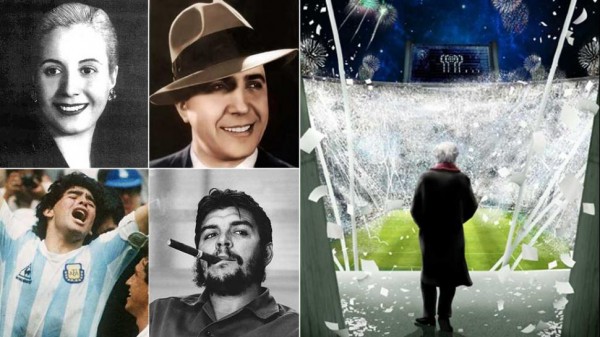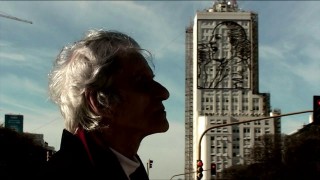
El Olimpo Vacío is a powerful Argentine political film revolving around the figure of an outsider intellectual, Juan José Sebreli, but manages to transcend it. Sebreli becomes a touchstone to go through Argentina and its dilemmas, and questions almost everything it should be ashamed of. Through national icons like Gardel, Evita, Che, and Maradona, the film establishes a dialogue with recent Argentine history and it does so with extraordinary energy, supported by a rarely seen use of all kinds of archive material in an almost Dionysian pace. The film arrives to a surprising reflection on nationalism, demagogic governments and delusions of unanimity—problems that are common to regimes that cannot find their ways to a freer and more egalitarian society, a dilemma which deeply resonates with Cuba’s own recent history.
THE WRITER, THE BOOK, AND THE FILM… ALL INTERTWINED
 Juan José Sebreli is an Argentinian intellectual who has swum against the tide his entire life. True to form, in 2008 he wrote a particularly controversial book, Comediantes y mártires, where he set out to demystify four of his country’s most beloved idols: Gardel, Evita, Che and Maradona. The book was awarded Spain’s Casa de América prize. While Sebreli traveled to Madrid to receive the award, his government chose those very icons to represent Argentina at the 2010 International Book Fair at Frankfurt, thus unleashing a public debate. Through the eyes of its protagonist, the film puts forth several questions: What role do popular icons play in contemporary society? Do they embody a national identity? Is there a positive and a negative side to their role? Or are they merely used for commercial and political exploitation?
Juan José Sebreli is an Argentinian intellectual who has swum against the tide his entire life. True to form, in 2008 he wrote a particularly controversial book, Comediantes y mártires, where he set out to demystify four of his country’s most beloved idols: Gardel, Evita, Che and Maradona. The book was awarded Spain’s Casa de América prize. While Sebreli traveled to Madrid to receive the award, his government chose those very icons to represent Argentina at the 2010 International Book Fair at Frankfurt, thus unleashing a public debate. Through the eyes of its protagonist, the film puts forth several questions: What role do popular icons play in contemporary society? Do they embody a national identity? Is there a positive and a negative side to their role? Or are they merely used for commercial and political exploitation?
The conflict that erupts between Sebreli’s book and the theme chosen for the Frankfurt fair converge and give rise to a deep introspection. Cinema has often shown the painful poverty that abounds in the outlying countries of the Americas. El Olimpo Vacío delves into the roots of social injustice in a country that, despite meeting the conditions for progress, is bogged down in a vicious historical cycle. Sebreli is bent upon showing us the flip side: a civilian support of dictators, the blind nationalism inbred in the game of fútbol, and popular enthusiasm for an absurd war—all signs of a collective madness that today’s society would rather forget, but that Sebreli insists upon submitting to a thorough examination.
El Olimpo Vacío is in Spanish, with English subtitles. The screening will be followed by a conversatorio in Spanish with Juan José Sebreli and Carolina Azzi, one of the film’s directors. Prof. Perla Rozencvaig, director of our Cinema Program, will moderate the discussion. Sebreli’s book, Comediantes y mártires, will be available for sale.
BARUCH COLLEGE
25th Street, bet. Lexington and Third Aves., NYC
VC 5th Floor – ROOM 165
SPACE IS LIMITED
CCCNY Members, Students, and Faculty: Free Admission
Non-Members: Optional donation
For reservations, write to: cccofny@aol.com
Presented in association with the Department of Modern Languages and Comparative Literature at Baruch College

With the promotional support of
 and
and 